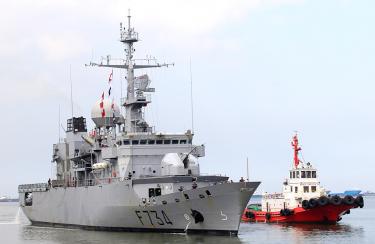A French warship passed through the Taiwan Strait earlier this month, US officials said, a rare voyage by a vessel of a European nation that is likely to be welcomed by Washington, but increase tensions with Beijing.
The passage is a sign that US allies are increasingly asserting freedom of navigation in international waters near China, and it could open the door for other allies, such as Japan and Australia, to consider similar operations.
Two officials, speaking on condition of anonymity, said a French military vessel carried out the transit on April 6.
One of the officials identified the warship as the French frigate Vendemiaire and said it was shadowed by the Chinese military.
The officials said that as a result of the passage, China notified France it was no longer invited Tuesday’s naval parade to mark 70 years since the founding of China’s People’s Liberation Army Navy.
The parade featured Chinese aircraft carrier the Lioaning and Chinese-made Nanchang guided missile destroyers. Warships from India, Australia and Japan also participated.
France yesterday reaffirmed its commitment to “freedom of navigation under maritime law,” an aide to French Armed Forces Minister Florence Parly said.
“The national navy crosses the Taiwan Strait about once a year, without any incident nor reaction,” the aide said after China confirmed lodging an official protest over the voyage.
The French transit comes against the backdrop of increasingly regular passages by US Navy and Coast Guard vessels through the Taiwan Strait.
Asked by reporters to comment on the passage of the French warship, President Tsai Ing-wen (蔡英文) said that the Taiwan Strait is in international waters and that all kinds of vessels pass through it regularly.
The armed forces have “complete and precise” information regarding all vessels passing through the waterway, regardless of whether they are military or civilian vessels, she said.
Ministry of National Defense spokesman Major General Chen Chung-chi (陳中吉) said by telephone that the Strait is part of busy international waters and it is “a necessity” for vessels from all nations to transit through it.
He said the ministry would continue to monitor the movement of foreign vessels in the region.
There was no immediate comment from the Chinese Ministry of Foreign Affairs or Ministry of National Defense.
“This is an important development both because of the transit itself, but also because it reflects a more geopolitical approach by France towards China and the broader Asia-Pacific [region],” said Abraham Denmark, a former US deputy assistant secretary of defense for East Asia.
The transit is a sign that nations such as France are not only looking at China through the lens of trade, but from a military standpoint as well, Denmark said.
Last month, France and China signed deals worth billions of euros during a visit to Paris by Chinese President Xi Jinping (習近平).
French President Emmanuel Macron wants to forge a united European front to confront Chinese advances in trade and technology.
“It is important to have other countries operating in Asia to demonstrate that this is just not a matter of competition between Washington and Beijing, that what China has been doing represents a broader challenge to a liberal international order,” said Denmark, who is with the Woodrow Wilson Center think tank in Washington.
Additional reporting by Staff writer and AFP
Source: Taipei Times - 2019/04/26





















